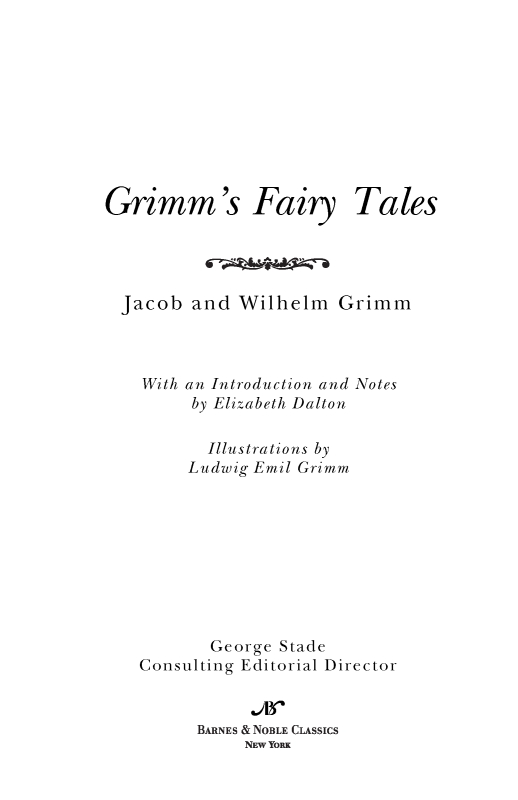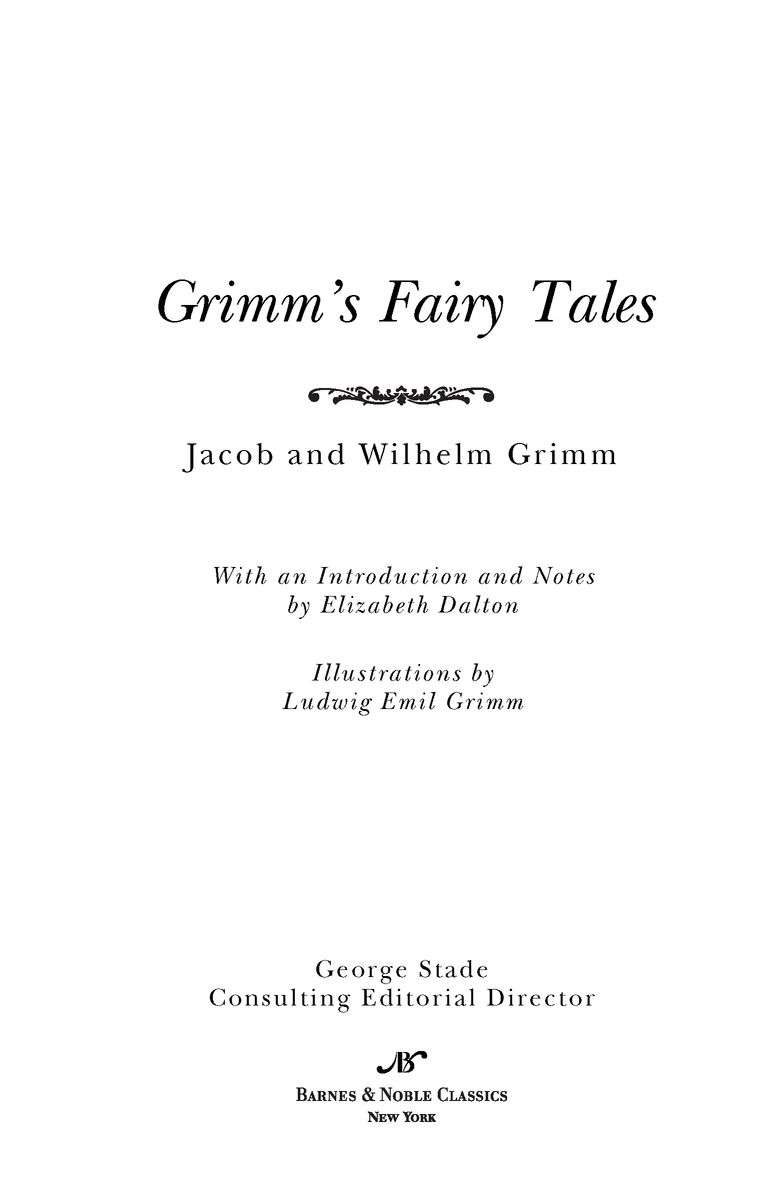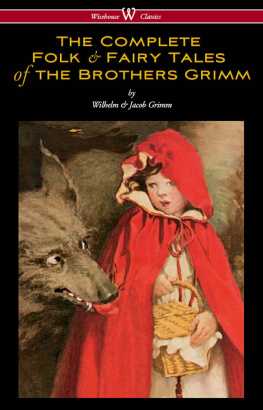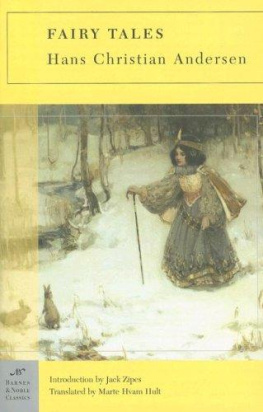
Table of Contents
From the Pages of
Grimms Fairy Tales
In the olden time, when wishing was having, there lived a King, whose daughters were all beautiful; but the youngest was so exceedingly beautiful that the Sun himself, although he saw her very often, was surprised whenever she came out into the sunshine. (page 15)
Dear children, I am going away into the wood; be on your guard against the Wolf, for if he comes here, he will eat you all upskin, hair, and all. (page 26)
Witches have red eyes, and cannot see very far; but they have a fine sense of smelling, like wild beasts, so that they know when children approach them. When Hansel and Grethel came near the witchs house she laughed wickedly. (page 61)
Rapunzel! Rapunzel!
Let down your hair! (page 67)
The step-mother and the two sisters were amazed and white with rage, but the Prince took Cinderella upon his horse and rode away.
(page 93)
One day the grandmother presented the little girl with a red velvet riding hood; and as it fitted her very well, she would never wear anything else; and so she was called Little Red Riding Hood.
(page 101)
After seven months a child was born, who, although he was perfectly formed in all his limbs, was not actually bigger than ones thumb. So they said to one another that it had happened just as they wished; and they called the child Thumbling. (page 131)
Oh mirror, mirror on the wall,
Who is the fairest of us all? (page 178)
Are you called Rumpelstiltskin? (page 194)
There was once upon a time an excessively proud Princess, who proposed a puzzle to every one who came a-courting; and he who did not solve it was sent away with ridicule and scorn. (page 357)
The four and seventieth time, the Hare was unable to run any more. In the middle of the course he stopped and dropped down quite exhausted, and there he lay motionless for some time. But the Hedgehog took the louis dor and bottle of brandy which he had won, and went composedly home with his Wife. (page 479)
Needle, Needle, sharp and fine,
Fit the house for wooer mine. (page 481)

The Brothers Grimm

The name Grimm is forever linked with the strange and magical folktales two brothers labored to collect and preservestories peopled by characters like Cinderella, Rumpelstiltskin, Hansel and Grethel, Snow-White, and the Frog Prince. Jacob Ludwig Carl Grimm and Wilhelm Carl Grimm were born in the German village of Hanau, Jacob in 1785 and Wilhelm a year later. Their father, Philipp, was a successful lawyer who fostered in his sons a strict sense of moral integrity and purpose. The brothers early education was both classical and Calvinist, and Jacob and Wilhelm were devoutly religious. The familys prosperity turned to poverty when Philipp died suddenly in 1796. His widow, Dorothea (nee Zimmer) Grimm, with six children to care for, was forced to leave her large house and rely on the support of her family. With the aid of Dorotheas sister Harriet, a lady-in-waiting to the princess of Hessia-Kassel, Jacob and Wilhelm were admitted to Kassels prestigious Lyzeum, where they received an excellent education.
Erudite, determined, and devoted to each other, the brothers enrolled at the University of Marburg, Jacob in 1802 and Wilhelm in 1803, both intending to study law. There they came under the influence of Professor Friedrich Karl von Savigny, the founder of historical jurisprudence, who taught that laws are correctly interpreted by tracing their historical and cultural origins. The brothers, shifting their interests away from law, adapted von Savignys methods to the study of linguistics and philology.
Jacob and Wilhelm were also deeply affected by the German Romantic movement, whose emphasis on folk culture would inspire their famous fairy-tale collection, Kinder- und Hausmrchen (Childrens and Household Stories), first published in two volumes, in 1812 and 1815. Beginning this work as both a study of the German language and an attempt to document the customs of the German people, the brothers collected their folktales by mining a variety of sources, including peasants and lower-class people, nannies and servants, educated young women from upper-middle-class and aristocratic families, and accounts in books and magazines.
The Grimms worked as librarians, and both became professors of German literature at the University of Gottingen. But in 1837 the brothers, renowned and respected scholars with many published works to their credit, were forced from their university posts for political reasons. Unemployed and in financial difficulty, they set to work on their most ambitious project, the Deutsches Wrterbuch (German Dictionary), a lexicographical history of the German language that would prove to be a colossal and important undertaking and serve as the prototype for the Oxford English Dictionary. In 1840 the Grimms received professorships at the University of Berlin, where they continued their work on the German Dictionary and other projects in philology, linguistics, and German literature.
After the German revolution of 1848, the Grimm brothers were elected to parliament, but their hopes for democratic reform and German unification were dashed, and they left politics disappointed. Jacob retired from teaching at the university to do research, and published an important philological study, Geschichte der deutschen Sprache (History of the German Language), and Wilhelm retired from his university post a few years later. In their final years the brothers devoted their energies to completing the German Dictionary but died before reaching the letter G; finishing the work was left to twentieth-century scholars.
From 1815 onward Wilhelm was largely in charge of continuing work on successive editions of the Kinder- und Hausmrchen what has come to be known as Grimms Fairy Talesoften editing the stories to emphasize moral lessons or to remove material deemed offensive to bourgeois audiences. Although not immediately successful, the Grimm collection has stood the test of time and today is arguably the worlds most famous and beloved book of folktales.
Wilhelm Grimm died on December 16, 1859. Jacob Grimm died on September 20, 1863.
The World of Jacob and Wilhelm Grimm and Their Fairy Tales
| 1785 | Jacob Ludwig Carl Grimm is born on January 4 in Hanau, in what is now Germany, to Philipp Wilhelm and Doro thea (nee Zimmer) Grimm. He is the second of their chil dren; Friedrich Hermann Georg, born in 1783, died in infancy. |
| 1786 | Wilhelm Carl Grimm is born on February 24 in Hanau. |
| 1787 | Philipp and Dorothea Grimms fourth son, Carl Friedrich, is born. Wolfgang Amadeus Mozarts opera |











